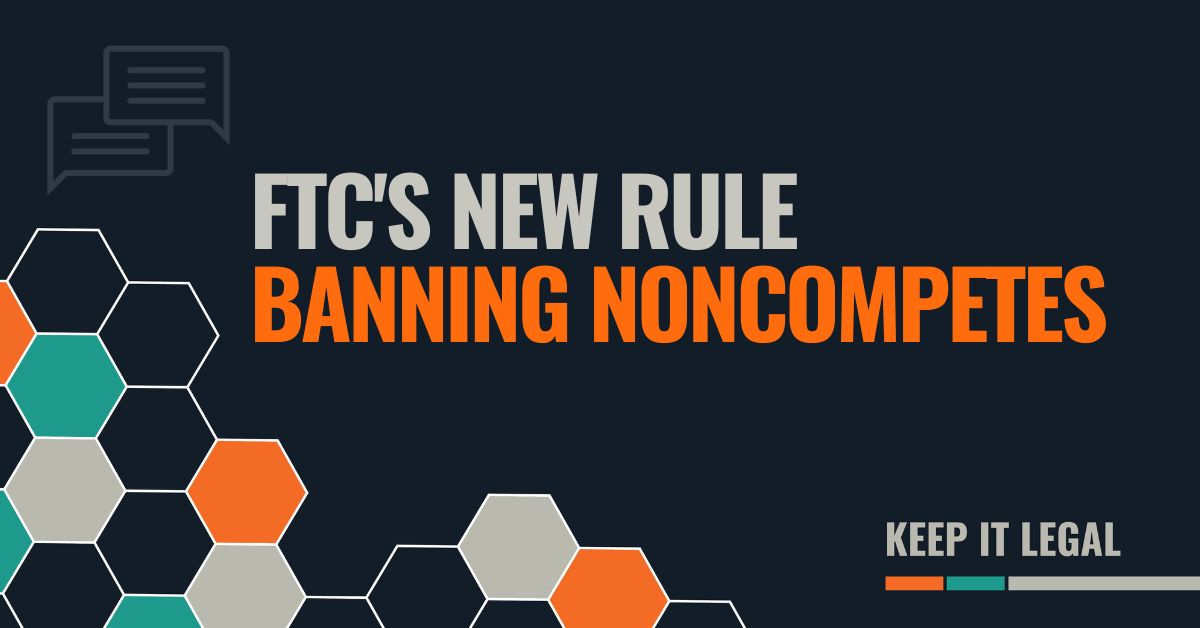Businesses based in California have been barred, in most cases, from enforcing noncompete clauses against former employees for over 150 years. But most other states still allow employee noncompete clauses. Last week, however, the Federal Trade Commission (FTC) announced a new rule that would ban most noncompete clauses nationwide.
The rule is not in effect as of the date of this post. It would go into effect 120 days after the rule is published in the Federal Register. However, the rule has already been subject to legal challenges, so it’s possible courts may delay the rule’s implementation and either strike it down completely or compel the FTC to revise it.
This post will examine the rule as published. If the rule ends up being changed, I’ll post a follow-up.
What is a Non-Compete Clause?
The new rule defines a “non-compete clause” as a term or condition of employment that prohibits a worker from, penalizes a worker for, or functions to prevent a worker from (A) seeking or accepting work in the United States with a different person where such work would begin after the conclusion of the employment that includes the term or condition; or (B) operating a business in the United States after the conclusion of the employment that includes the term or condition. The rule further provides that “term or condition of employment” “includes, but is not limited to, a contractual term or workplace policy, whether written or oral.” This applies to terms and conditions that expressly prohibit a worker from seeking or accepting other work or starting a business after their employment ends, as well as agreements that penalize or effectively prevent a worker from doing the same.
Who Does This Apply To?
It applies to most workers in the U.S. It is retroactive, meaning if you have a noncompete clause today, it will become void once the rule is effective. However, there are some limited exceptions.
Existing noncompetes for senior executives can remain in force – meaning the rule is not retroactive for this group of employees. The rule defines “senior executives” as workers earning more than $151,164 annually and who are in policy-making positions. Employers, however, are prohibited from entering into or enforcing new noncompetes with senior executives.
The rule also “does not apply to a noncompete clause that is entered into by a person pursuant to a bona fide sale of a business entity, of the person’s ownership interest in a business entity, or of all or substantially all of a business entity’s operating assets.” So if you sell your business, you can enter into an enforceable clause that prevents you from competing with the business in the future.
Finally, there are a small number of businesses who are not subject to the FTC Act, specifically some banks, non-profit healthcare businesses, and stockyards. This rule would therefore not apply to those businesses.
What If a Business Doesn’t Follow the Rules?
The rule defines covered noncompete clauses as an “unfair method of competition” that violates the FTC Act. This means that entering into a covered noncompete, or attempting to enforce one, is an unlawful act. Violators could be subject to fines, penalties, and injunctive relief.
Does a Business Need to Notify Employees?
Employers who have noncompete clauses in place must provide notice to workers bound to an existing noncompete that the noncompete agreement will not be enforced against them in the future. This notice must be made before the rule takes effect. The rule includes model language and instructions on how to provide such notice.
If you have a question about how this new rule applies to you or your business, feel free to contact me.


